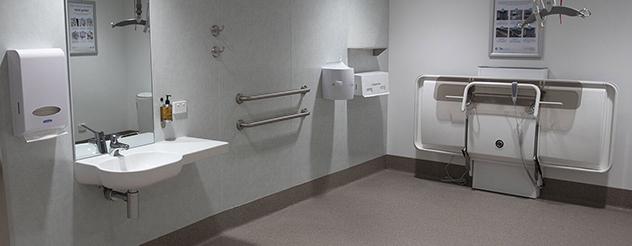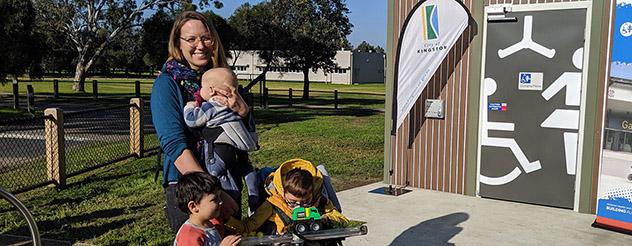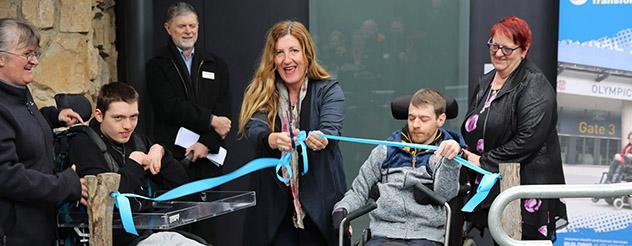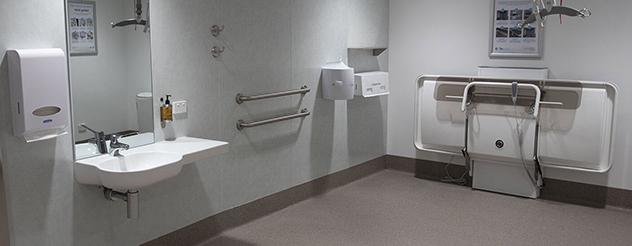
- Home
- News and events
- Changing Places, changing lives - Celebrating Changing Places Awareness Day on July 19
Changing Places, changing lives - Celebrating Changing Places Awareness Day on July 19
The Changing Places program has moved to the Department of Families, Fairness and Housing.
Can a toilet and changing facility change lives? If the testimonials of many people with disabilities, their families and carers are any guide, the answer is a resounding 'yes'.
The positive impact of fully accessible toilets and change facilities on the lives of people with disabilities will be celebrated during Changing Places Awareness Day on July 19.
"I’m thrilled. I never really thought I would get emotional about a toilet, but it’s just a huge game changer for us. We’ve recently moved from the UK back to Australia for Amos’ needs and we’re just so thankful that there are people thinking of us."
Rebecca, mum
Changing Places are larger than standard accessible toilets with adult-sized change tables and tracking hoists designed to cater for people with high support needs.
Unless it directly affects ourselves or our families, we probably don’t realise that access to a useable changing facility is not only a human right, but also a fundamental way of building a more inclusive community for people with disabilities.
People with disabilities and their families often suffer social isolation and a sense of being ‘locked out’ of public venues due to a lack of adequate toilet facilities that meet their needs. Some families, desperate to live a life outside of their four walls, have no choice but to change their child on the cold floor of a public toilet.
Amos’ mother Rebecca says “We’re just at a point where he’s too tall for the baby change tables. I’ve had to change him on the floor in bathrooms and it’s unsanitary, I don’t want to do that. Usually the option is to change him in the car, but it’s really uncomfortable for him.”
Since 2014, Changing Places have been installed in major public spaces across Australia, the bulk of which are within Victoria.
Recently the 100th Changing Places facility was opened at Bicentennial Park in Chelsea, in Melbourne’s south-east.
Leading the way
Inspired by the UK initiative, the first Australian Changing Places toilet was launched in Victoria by Maroondah City Council in 2014.
Victoria has been a leader in promoting Changing Places and was the first state to directly fund the construction of Changing Places in 2015. Since then, the State Government has funded 32 Changing Places and incorporated the facility into new infrastructure including hospitals, sports stadiums and train stations.
Western Australia and other states soon followed Victoria’s lead by promoting and funding Changing Places within their own public facilities. The private sector were also early adopters with nearly every major shopping centre company in Australia committing to build Changing Places.
Changing places means we can all go places
The new Changing Places facility at Wallan’s popular Hadfield Park Adventure Playground has been a big win for 10-year old Ally Hopper and her family. The Hoppers have long enjoyed the all-abilities adventure playground, and had advocated for a Changing Places facility to be built there.
Ally’s Mum Phyllis says "It’s a great new asset to the park. Now I can change my daughter in privacy and dignity, with plenty of space and on a comfortable change table, rather than having to head home or change Ally in the boot of my car. I also love that I can now take my time and not feel that I have to ‘hurry up’, which will make it a more pleasant experience for both Ally and myself."
Hamer Hall’s Changing Places facility means people of all ages and abilities can relax and enjoy their visit to the arts precinct and Melbourne's CBD. One of the latest Changing Places in Melbourne, its opening gives advocates like Brendan and Michael, along with their families, a new sense of independence.
Brendan’s mother Di commented "It means coming to this precinct as a family is more doable than it's ever been, and we won't be separated by invisible barriers. In fact, Brendan will be able to access his own entertainment without us being present."
You can learn more about the Changing Places initiative in Victoria at the Department of Families, Fairness and Housing.
Locations of all currently open facilities in Australia and building specifications and guidelines can be found on the national Changing Places website.
Related content

05 May 2019
Changing Places inspires a welcome change to the National Construction Code...
In welcome news for people with a disability, a new class of accessible toilet is now mandated withi...
10 July 2019
100th Australian Changing Places facility now open at Bicentennial Park
The 100th Changing Places facility in Australia has officially been opened at the popular Bicentenni...
02 August 2019
Healesville Sanctuary opens new Changing Places facility
A Changing Places facility has opened at Healesville Sanctuary, ensuring people with complex disabil...
25 May 2019
Changing Places user and venue owner surveys – tell us what you think!
Your feedback will help us to improve facilities and decide the best locations for future Changing P...
26 October 2018



